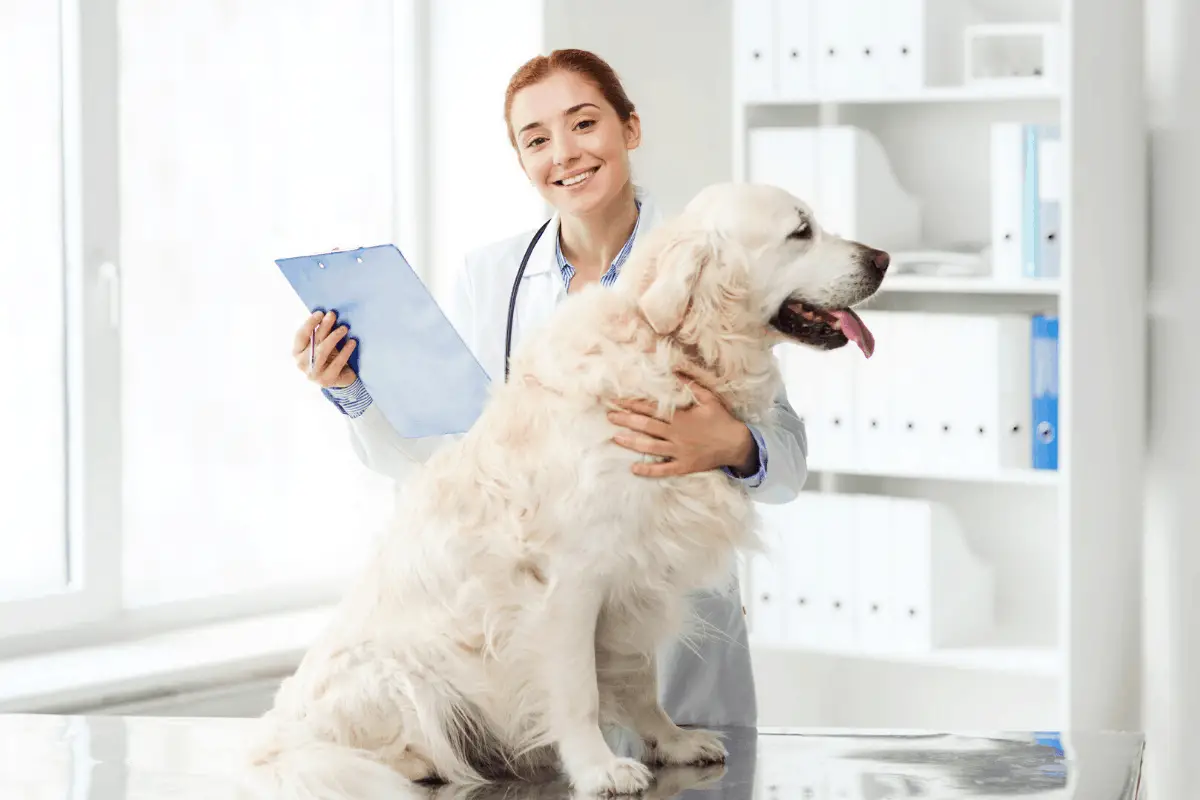Cancer is a heartbreaking and all-too-common diagnosis in Golden Retrievers. While there are no guarantees to preventing cancer, this article will better help you understand it, and give your Golden a better shot at a healthy life.
Table of Contents
Can You Prevent Cancer in Golden Retrievers?
Researchers at the Morris Animal Foundation in Denver, Colorado are trying to determine how often cancer happens in Goldens by conducting a prospective study known as the Golden Retriever Lifetime Study.
So far, it is estimated that almost 60% of the 3,000 plus Golden Retrievers in the study will be affected by cancer. If this rate is applicable to Goldens across the country, this would mean that every six in ten Golden Retrievers could be impacted by cancer at some point in their life.
Why is this rate so high? What are the most common cancers for Goldens, and is there any way that we can prevent them from happening?
What Is Cancer?
Cancer refers to disease that develops when cells in the body replicate abnormally. As cells multiply, millions of copies of genetic material known as DNA are created in a matter of seconds.
Mistakes are often made in the replication process, and the immune system is trained to seek out these mistakes and destroy them before they can cause problems. However, if a mistake is missed by the immune system, this mistake will be replicated further.
This is how cancer cells begin, and replication can be gradual or can occur very quickly. Cancer cells can form discrete tumors or can affect areas like bone marrow which have more far-reaching effects. Cancer can form in dogs the same way that it does in humans.
There are numerous environmental factors that can increase the risk of cancer in dogs such as UV-ray exposure from the sun and secondhand smoke from cigarettes. There are also genetic risk factors for cancer that are still being actively studied.
Over the past several decades, veterinarians have observed that certain dog breeds have a higher risk for certain cancers. This is called a genetic predisposition, and it is linked to problems with breeding such as linebreeding.
Linebreeding is when a dog is bred with a distant relative. Health problems can also arise from breeding for certain traits, like how a Dalmatian is bred for his spots – the more spots present, the more likely he will develop urinary problems in life.
Golden Retrievers are bred for their personalities and their appearance, but there is a chance that this kind of selection could increase their risk for disease later.
Common Cancers in Golden Retrievers

There are many different types of cancer, each affecting one or multiple parts of the body. In Golden Retrievers, the four most common types of cancer are:
- Mast cell tumors
- Hemangiosarcomas
- Lymphoma
- Osteosarcoma
Mast Cell Tumors
Mast cell tumors are usually solitary skin tumors but can also affect the spleen, liver, and intestines. Mast cells are types of white blood cells that help mount a response to allergens.
When activated, mast cells release compounds like histamine in small amounts. Mast cell tumors, however, can release excessive amounts of these compounds and can cause severe body-wide anaphylaxis, which is life-threatening.
Treatment consists of surgery, chemotherapy, and sometimes radiation treatments.
Hemangiosarcomas
Hemangiosarcomas are caused by cancerous cells of the blood vessels, so organs that are heavily involved in blood flow like the spleen, heart, and liver are the most likely to be affected.
Hemangiosarcoma tumors can develop very quickly, becoming large blood-filled tumors. They can rupture with or without any obvious trauma, causing life-threatening internal bleeding.
Surgery and chemotherapy are recommended treatments, but even with immediate intervention, hemangiosarcomas carry a very poor survival rate due to their ability to spread quickly or metastasize.
Lymphoma
Lymphoma is a type of cancer that affects the lymph nodes and parts of your dog’s lymphatic system such as the spleen and lymphatic vessels. Lymph nodes and vessels are scattered throughout the body, making it possible for dogs to have localized or multicentric lymphoma. Chemotherapy is the treatment of choice for lymphoma and has fair to good survival times if treatment is initiated right away.
Osteosarcomas
Osteosarcomas are aggressive tumors that affect a dog’s bones. These are usually solitary tumors that cause bone to become very fragile and susceptible to fractures that cannot be repaired. Osteosarcomas mostly affect long bones in the forelimb or hindlimb, but can occur in other places. Limb amputation and chemotherapy are highly recommended by cancer specialists.
Common Health Issues
Visit our article on Golden Retriever Common Health Issues to learn more about what to look out for in Golden Retrievers.
Ways to Help Prevent Cancer in Dogs

Because there are so many risk factors, there is no one way to completely prevent your Golden from developing cancer. However, veterinarians and researchers are able to detect some cancers earlier, and there are also ways to decrease cancer risks.
1. Diet
Make sure that you are feeding your dog a well-balanced diet. This can be a commercial diet that meets AAFCO requirements or a home-cooked diet that has been formulated by a veterinary nutritionist.
There is no scientific evidence to support the feeding of raw diets at this time. In fact, current research shows that there is an increased risk of exposure to harmful bacteria like Salmonella and Campylobacter, and this can affect both you and your dog.
Grain-free diets should also be avoided because the FDA is currently investigating a possible link between grain-free foods and dilated cardiomyopathy. Golden Retrievers have been implicated as the most common dog breed affected by this3.
2. Supplements
Many of the supplements available today contain ingredients such as glycosaminoglycans and omega-3 fatty acids. Glycosaminoglycans (or GAGs) are sugar compounds like glucosamine, chondroitin, and hyaluronic acid.
These are all build blocks for cartilage, which acts as a shock absorber for joints, and have a protective effect on the intestines and urinary bladder. GAGs also help prevent inflammation in the body, as do omega-3 fatty acids. Omega-3s like EPA and DHA are found in fish oils.
Less common supplements may also be beneficial. Turmeric, which is traditionally used as a spice in human food, was shown to have a protective effect against skin and colon cancer in humans.
It helps enhance certain detoxifying enzymes in the body and, when used in a lab setting, was shown to stop the replication of tumor cells when turmeric was directly applied.
3. Spaying/neutering
The question of when to spay or neuter your dog has been hotly debated over the last few years. Most veterinarians in the United States have encouraged spaying/neutering as a puppy because puppies tend to be smaller and heal faster after surgery.
Early surgery also helps decrease the risk for behavior problems, decreases the risk of mammary cancer in females, and eliminates the risk of testicular cancer in males and ovarian and uterine cancer in females. The euthanizing of healthy animals in shelters has drastically reduced over the last few decades thanks to spaying and neutering.
But how early is too early to spay or neuter? One retrospective study looked at spay/neuter ages in Golden Retrievers and found that there may be a link between early spay/neuter and increased risk of hip dysplasia, cruciate ligament tears, and the four common cancers listed above.
A major criticism of the study, however, is that the study only looks at Golden Retrievers and was a retrospective study, so there are still many questions. At this time, the general consensus is to have a discussion with your veterinarian about what you both think will be best for your Golden.
4. Veterinary visits
Make sure you take your Golden Retriever to see his vet at least twice a year. As he gets older, blood and urine testing may be common screening tools that can help detect health problems early. However, normal lab tests cannot completely rule out cancer.
Check your pup every two to three weeks for lumps and bumps. Any bump larger than one centimeter in width should be tested.
Conclusion
Cancer cannot be fully prevented, but there are ways to keep your Golden Retriever healthy, which will boost his immune system and decrease his risk for developing cancer. Diet and supplements can make a difference and be sure to talk to your veterinarian about when to have your pup spayed or neutered.
As was stated in the beginning, over half of Golden Retrievers will experience cancer. If you are worried about the financial burdens that come with that, Embrace Pet Insurance is very affordable and recommended.
Whether you get pet insurance or not, consistent visits to your veterinarian can be helpful in maintaining the health of your beloved golden retriever.

